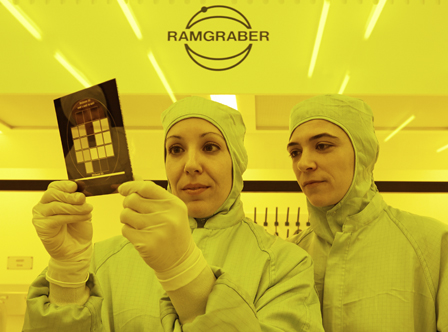PROJECTS



Mercedes Aja, Director of Persons and Organization at IK4-TEKNIKER, puts her stakes on people to further their motivation and leadership skills.
One of the 5 lines of the IK4-TEKNIKER 2020 Strategic Plan is geared towards getting "the best people". It is certainly not the first time that, within our strategic formulation, we have actually dedicated a space to people. Compared to other organisations, we are a knowledge-intensive company and this confers a high degree of prominence to the IK4-TEKNIKER team. Therefore, excellence and competitiveness at a technological centre are focused on people or, perhaps, on people only.
This being so, what does getting the best people mean?, how can we get them, how can know that this is so?, …
Obviously "getting the best people" does not only refer to human qualities, but to the work they do: this concept is connected to work that is well done, with the best possible contribution in terms of collective work at IK4-TEKNIKER. This can only be achieved by combining several aspects the centre will be focusing on over the next few years: attracting talent, training staff, motiving people more and improving leadership skills.
But this is no easy task. The reactivation of the job market, that is now continuously demanding high qualification profiles, has made job offers exceed the availability of talent, especially in some key specialities for the centre. This is why IK4-TEKNIKER must use all elements within its reach to reinforce is attractiveness as an employer organisation to hire the right people.
We must offer current and future employees opportunities, so they can further their training in terms of technical, management, relational and emotional matters. Paradigms change, technologies evolve (some undergo a revolution) and some work is being automated. Therefore, adapting no longer means knowing how to respond, grow and coexist in this environment. The mere fact of being ready will be an advantage as regards doing things successfully and addressing new challenges. Offering prospects for a future in which people will be able to grow professionally and personally is no longer an option, but a key element to retain the best people. We must be aware of the fact that investing in the development of talent must be positive for people because retention is an illusion with a date of expiry. What now belongs to the past is the model of "working for the same company throughout your entire life".
It does not suffice to survive in an environment undergoing continuous transformations or developments, or to be attractive, or to have a solidly trained workforce, although it is highly significant. For sure, we all know teams of professionals that are not especially brilliant but have achieved major successes through management actions geared towards good leadership practices (and the opposite). The world of sport, for instance, features many examples of this kind. Peter F. Drucker, one of the 20th century's leading authors on management, once stated “Your first and most important task as a leader consists in taking charge of your own energy and then help to orchestrate the energy of those around you”. Getting the best people is one of the main pillars supporting good leadership. Working on listening, transparent communication and feedback will allow us to reinforce leadership and obtain the very best from people. It's about discovering what motivates each person on the team and about listening. It's about providing clear and timely information, about offering contexts in which people know what is expected of their work and how this impacts the whole, so they con do things efficiently, learn from errors and allow them to modulate their contribution. “Orchestrating the energy of those around you requires, therefore, that you listen to the music each one plays (what they do and moves them), and provide feedback to open up to new sounds and instruments (different points of view), focusing and aligning the teams until the end result is harmonic, i.e., a symphony (the goals to be achieved).
Continuing with the musical simile, you've probably hard a choir sing at some point in time. Think what it would be like if you were to hear each voice or string separately or out of synch. It wouldn't be the same, would it? Or if you were to focus on each singer individually you might come across wonderful soloists but also some people singing out of tune. Each person has to make a contribution towards the whole and become responsible for offering their expertise to make things better. Not everybody is a soloist nor does everybody sing out of tune. A harmonic whole is achieved through diversity and by complementing people's skills. In this context, the best people become co-responsible in terms of achieving the best global outcomes and involving themselves in the symphony and enjoying the applause generated by eagerness, motivation and a greater feeling of belonging to an organisation.
In short, the strategic approach based on "getting the best people" means we must be more emphatic when conjugating verbs related to attracting, training, leading, communicating and making people co-responsible in terms of the 2020 time horizon. It is the gerund, therefore, and not the imperative or conditional tenses that will help IK4-TEKNIKER achieve the goals set in its Strategic Plan.



